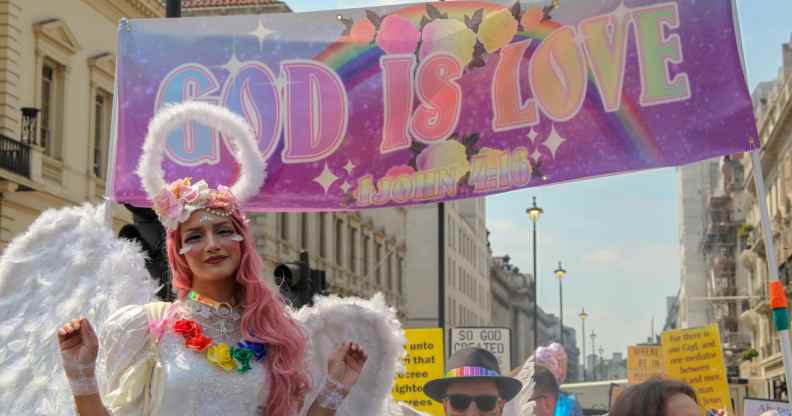Christian groups to investigate impact of ‘toxic’ anti-LGBT+ church rhetoric

LGBT+ Christians at Pride in London, 2018. (NurPhoto via Getty/ Alex Cavendish)
A vital new research project will examine the impact of “the increasingly toxic rhetoric around sexuality and gender identity” on LGBT+ Christians.
A survey will be launched on World Mental Health Day (10 October) to measure how safe “increasingly vulnerable” LGBT+ Christians feel.
The vital research, looking at the wellbeing of LGBT+ people in religious spaces which “can cause significant harm and trauma”, is being conducted by a consortium of nine Christian LGBT+ organisations.
It draws on the theme of government’s international LGBT+ conference to be held next year: Safe to be Me.
The survey was instigated by Jayne Ozanne, director of the Ozanne Foundation, who said: “Many LGBT+ Christians feel increasingly vulnerable in their local churches given the increasingly toxic rhetoric around sexuality and gender identity.
“We thought it essential to measure in a safe and anonymous way just how safe people feel able to be about who they are, and what steps should be taken to make them feel safer.”
The survey’s launch on World Mental Health Day will also coincide with the Church of England’s first “Safeguarding Sunday”, an initiative “encouraging local churches to use their regular Sunday service to explore together what safer places look like”.
Dr Sarah Carr, an LGBT+ mental health expert who is overseeing the survey, said: “It is critical that LGBT+ people’s well being is prioritised in spaces which we know have and still can cause significant harm and trauma.
“By asking them directly about how they feel we can build a picture of what is happening in the UK today, and identify steps that they tell us will help improve things.”
Executive director of OneBodyOneFaith Luke Dowding, whose organisation coordinates LGBT-friendly Christian spaces and gatherings and is part of the consortium organising the survey, explained: “We know that many LGBT+ people have a deep faith, but some feel unable to attend church because they fear that they will not be welcomed or understood in their local places of worship.
“We would therefore like to understand if there are LGBT+ Christians who do not currently go to church for fear of their safety, with a desire to learn what if anything local churches might do to help address these concerns.”
The online research survey will run for two weeks, with results to be made public in November, and all LGBT+ adult, self-identified Christian in the UK can take part, whether or not they attend church. Click here to take part.

